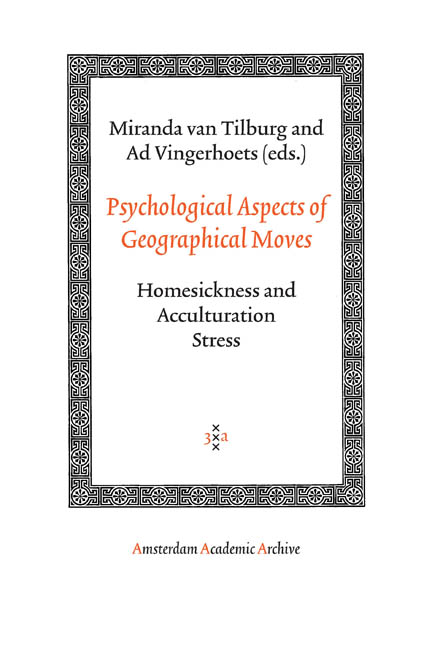Book contents
- Frontmatter
- Preface
- Contents
- Contributors
- 1 The Homesickness Concept: Questions and Doubts
- 2 Culture Shock, Homesickness, and Adaptation to a Foreign Culture
- 3 The Psychological Context of Homesickness
- 4 Geographical Moves and Psychological Adjustment
- 5 Homesickness and Acculturation Stress in the International Student
- 6 Psychological and Psychosocial Adjustment of Migrants: Families in a Changing Environment
- 7 Individual Differences in Acculturative Stress Reactions: Determinants of Homesickness and Psychosocial Maladjustment
- 8 The Cry for the Lost Placenta: Cultural Bereavement and Cultural Survival among Cambodians who Resettled, were Repatriated, or Stayed at Home
- 9 Children's Coping with Homesickness: Phenomenology and Intervention
- 10 Homesickness after Relocation during Early Adolescence
- 11 Personality, Temperament, and Homesickness
- 12 Homesickness, Personality and Personality Disorders: An Overview and Therapeutic Considerations
- 13 Health Issues in International Tourism: The Role of Health Behavior, Stress and Adaptation
- 14 Development of Psychopathology in International Tourists
- Miscellaneous Endmatter
3 - The Psychological Context of Homesickness
Published online by Cambridge University Press: 23 January 2021
- Frontmatter
- Preface
- Contents
- Contributors
- 1 The Homesickness Concept: Questions and Doubts
- 2 Culture Shock, Homesickness, and Adaptation to a Foreign Culture
- 3 The Psychological Context of Homesickness
- 4 Geographical Moves and Psychological Adjustment
- 5 Homesickness and Acculturation Stress in the International Student
- 6 Psychological and Psychosocial Adjustment of Migrants: Families in a Changing Environment
- 7 Individual Differences in Acculturative Stress Reactions: Determinants of Homesickness and Psychosocial Maladjustment
- 8 The Cry for the Lost Placenta: Cultural Bereavement and Cultural Survival among Cambodians who Resettled, were Repatriated, or Stayed at Home
- 9 Children's Coping with Homesickness: Phenomenology and Intervention
- 10 Homesickness after Relocation during Early Adolescence
- 11 Personality, Temperament, and Homesickness
- 12 Homesickness, Personality and Personality Disorders: An Overview and Therapeutic Considerations
- 13 Health Issues in International Tourism: The Role of Health Behavior, Stress and Adaptation
- 14 Development of Psychopathology in International Tourists
- Miscellaneous Endmatter
Summary
Introduction
Homesickness is a common experience. Everybody has an intuitive idea about homesickness is and how it is experienced. Many of us can even draw from personal experiences. Throughout history it has also been subject of many poets and writers. The first written accounts of homesickness can be found in the Bible, Psalm 137: “By the rivers of Babylon there we sat down, yeah wept when we remembered Zion” and in Homer's description of Ulysses who was weeping and rolling on the floor when he was thinking of home. From the 17th century onward systematic (case) studies of homesickness have been reported, although they are sparse. For instance, one case described by the 17th-century Swiss physician Johannes Hofer (cited in Rosen, 1975) is of a young man who was lying on his death-bed when homesickness was diagnosed. When he was sent home his condition improved immediately. Another illustration is the case, described by Jaspers (1909), of a 16-year-old maid who starts fires in four places in order to destroy the house. As a consequence she would be useless to the lady of the house and be sent home.
These personal accounts, in either prose or case studies, probably do not do justice to the very different manifestations of homesickness. However, insight into the psychological context of homesickness is very important for the generation of hypotheses. Furthermore, it is helpful in distinguishing homesickness from other more or less related concepts like nostalgia, depression and separation anxiety. The current scientific literature is rather slim and scattered. Therefore, in this chapter I will integrate these findings and discuss the nature of homesickness and the corresponding reactions. However, first homesickness will be differentiated from related concepts like nostalgia and grief.
How does homesickness relate to other concepts?
Homesickness is an emotion which is felt after leaving house and home and is characterized by negative emotions, ruminative cognitions about home, and somatic symptoms. The question is how this feeling can conceptually be distinguished from related emotions and syndromes like nostalgia, separation anxiety, school phobia, grief, depression, adjustment disorder, agoraphobia, depletion anxiety, claustrophobia, and topophilia. In this section homesickness will be compared with each of these concepts and resemblances and differences will be highlighted.
- Type
- Chapter
- Information
- Psychological Aspects of Geographical MovesHomesickness and Acculturation Stress, pp. 35 - 48Publisher: Amsterdam University PressPrint publication year: 2006
- 2
- Cited by



